Plasma cutters are an extremely popular tool for cutting metals and automotive work. They cut with speed, precision and can cut any conductive metal. Below is our buyer’s guide, comparison table and our top picks for plasma cutters for a variety of cutting thicknesses and including the best with built in air compressors.
Click any of the links below to find which welder is best suited for your needs.
- Best Cheap Plasma Cutter
- Best Plasma Cutter for the Money
- Best Plasma Cutter under $500
- Best Plasma Cutter Under $1000
- Best Plasma Cutter Under $1500
- Best Plasma Cutter with Built in Air Compressor
Contents
The Best Plasma Cutters Comparison Table
| Name | Image | Sever Cut | Voltage | Air Comp | Max Amps | Duty Cycle | Pilot Arc | More |
|---|---|---|---|---|---|---|---|---|
| Hypertherm Powermax 45 XP | 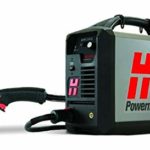 | 1" | 220V | No | 45 | 50% @ 45A | Yes | |
| Miller Spectrum 625 | 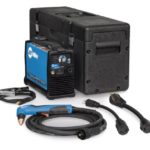 | 7/8" | Dual | No | 40 | 50% @ 40A | Yes | |
| Hypertherm Powermax 30 Air | 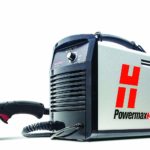 | 5/8" | Dual | Yes | 40 | 35% @ 30A | Yes | |
| Hypertherm Powermax 30XP | 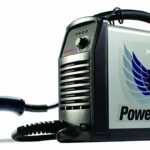 | 5/8" | Dual | No | 30 | 35% @ 30A | Yes | |
| Hobart Airforce 40i | 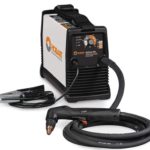 | 7/8" | Dual | No | 40 | 50% @ 40A | Yes | |
| Miller Spectrum 375 | 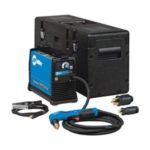 | 5/8" | Dual | No | 30 | 35% @30A | Yes | |
| Hobart Airforce 27i |  | 5/8" | Dual | No | 27 | 35% @ 27A | No | |
| Hobart Airforce 12ci | 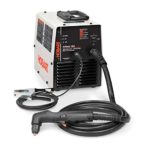 | 1/4" | 110V | Yes | 12 | 35% @ 12A | Yes | |
| Lotos LTP5000D | 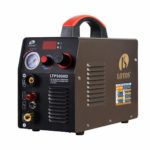 | 3/4" | Dual | No | 50 | 60% @ 50A | Yes | |
| Lotos LT5000D | 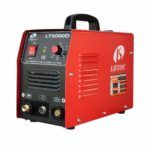 | 3/4" | Dual | No | 50 | 60% @ 50A | No |
1. Lotos LTP5000D
![]() Best for the money
Best for the money
![]() Best under $500
Best under $500
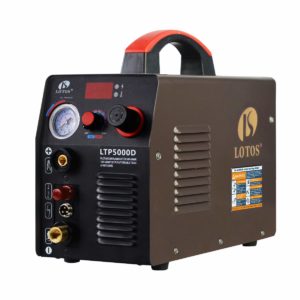 |
|
The Lotos LTP5000D probably the most popular plasma cutter on the market. This is a great choice to hobbyists that want versatile cutter but don’t want to spent too much money. It has pilot arc so it will cut cleanly through rusty or painted metal and it allows you to cut without touching the metal, unlike other cheap machines. It comes with dual voltage capability, but if you want to use 110V you’ll need to buy a 110V pigtail adapter. It does go through consumables quickly and won’t stand up to frequent use like the big brand plasma cutters, but the consumables are relatively inexpensive. It will cleanly cut through 1/2″ steel. You need to take your time with 1/2″ and 1/4″ but it will go through 1/8″ nice and fast. It cuts quite thick so it’s not ideal for more precise cutting.
Overall we think it’s the best bang for your buck plasma cutter there is. It’s perfect if you’re looking for a small plasma cutter at an affordable price for home hobby projects. If you’re looking for something even cheaper, check out the LT5000D, which is a similar model but without pilot arc. This unit has a 1 year warranty to protect you in the short term, but you might be better off looking at a Hypertherm unit if you want a more long-term machine.
|
Specifications
|
Pros
Cons
|
2. Hypertherm Powermax 30XP
![]() Best under $1500
Best under $1500
![]() Best for 1/4″
Best for 1/4″
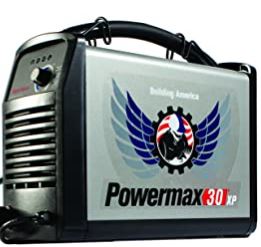 |
|
The Hypertherm Powermax 30 XP is an exceptional plasma cutter. Hypertherm take immense care when designing their units and put them together with unrivaled care (right here in the US). You know you’re going to get great results with a Hypertherm and that it will stand the test of time. These are build to handle heavy-duty use in professional environments and have a 3-year warranty.
This comes with everything you need to get cutting (apart from air), including a really nice hard carry case where you can store all your equipment such as the spare consumables that are supplied with the unit.
The 30XP is very compact and lightweight at just 21lbs and includes FineCut consumables for finer, more detailed cutting. It’s perfectly suited for 1/4″ steel but will also cut 3/8″ at 20IPM. The cut quality is clean and sharp and you can hook up to 110V or 220V.
Overall this is one of the most reliable plasma cutters on the market that produces quality results with long consumable life.
|
Specifications
|
Pros
Cons
|
3. Hypertherm Powermax 30 Air
![]() Best with built in air compressor
Best with built in air compressor
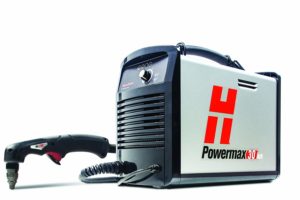 |
|
This is another excellent plasma cutter from Hypertherm and this time it includes a built in air compressor to make it more versatile. This is by far the best plasma cutter with a built in air compressor on the market. Hypertherm only build plasma cutters, and they focus a lot of energy into designing and building the best quality machines. This has the same excellent performance as the Powermax 30 XP and can cut 1/2 inch pretty comfortably with 3/8 inch being the ideal cut. Hypertherm also create the best consumables in the industry that are really long lasting so won’t cost you in the long term. Overall it’s light, portable, simple to use and produces great results – you can’t go wrong with this.
|
Specifications
|
Pros
Cons
|
4. Hobart Airforce 40ci
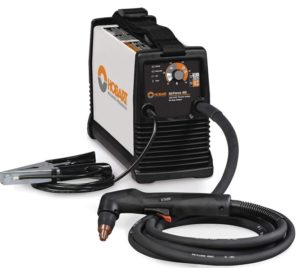 |
|
This is another great unit build by Hobart that’s new and updated. It’s capable of cleanly cutting 5/8 inch steel and severs up to 7/8 inch so it has a lot of power and now runs of 120V and 240V. It has a very good duty cycle with 60% @ 40A maximum power. It’s not too much more expensive than the 12ci and 27ci but has a lot more power behind it. This machine is built for industrial projects and won’t let you down.
|
Specifications
|
Pros
Cons
|
5. Lotos LT5000D
![]() Best cheap plasma cutter
Best cheap plasma cutter
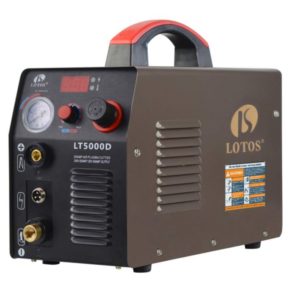 |
|
This model is pretty much exactly the same as the Lotos LTP5000D but without the pilot arc, so you won’t be able to cut through any rusted metal. The plus side is that it’s available for an even cheaper price, so if you’re looking for a cheap unit on a budget, this is perfect. Again it’s a great choice for DIY hobbyists and light workshop jobs where the quality of the cut isn’t that important but you want to save a bit extra money at the expense of only being able to cut clean metal.
|
Specifications
|
Pros
Cons
|
6. Hobart Airforce 12ci
![]() Best under $1000
Best under $1000
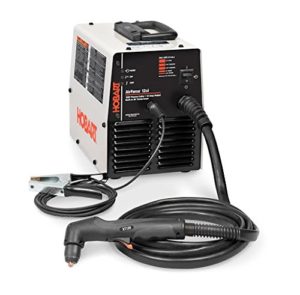 |
|
Our favorite plasma cutter under $1000 is the Hobart Airforce 12ci. The best feature about this is that is has a built in air compressor. This means you’ll never have to worry about connected it up to an air compressor and will be able to use it whenever you like. It gives quality results on thinner metal but is slow to cut anything over 1/8″ and slag builds up. It’s not as powerful as some of the other cutters such as the Powermax 30 Air or other Airforce models and it only runs off 110V. If you want to cut anything over 1/8″ you’re probably better spending a bit extra and getting the 27ci or 40ci. Overall it’s a great little unit that is built with Hobart quality and is a great choice for people who don’t require that much power but want a quality plasma cutter.
|
Specifications
|
Pros
Cons
|
What is a Plasma Cutter?
A plasma cutter is a machine that allows you to easily cut through any conductive metal including aluminum, stainless steel, copper, brass, steel and more. The plasma jet is formed by forcing gas through a nozzle in the torch and combining it with an electric arc generated from the power supply. This reaches temperatures of up to 40,000° F and can instantly melt and cut metal.
Why use a Plasma Cutter?
Plasma cutters are the best way to cut metal. They cut much faster than oxy-fuel and are more precise due to a smaller width of cut. This means the surrounding area is not affected by the heat and you can be more specific with the area of the cut. Plasma cutting can also cut any conductive metal, including stainless steel or aluminum so it’s a versatile option.
How to Set up your Plasma Cutter?
- Follow all the safety instructions issued in the handbook, including wearing a helmet to protect your eyes from radiation and welding gloves.
- Connect the air compressor to the plasma cutter (see instructions as the way to do this varies). If your plasma cutter has a built in air compressor you won’t need to do this.
- Connect your cutting torch to the plasma cutter
- Connect your ground clamp to the plasma cutter and securely attach it to the work piece. Ensure that there is no rust or paint where the clamp meets the work piece.
- Ensure all the connectors are firmly attached
- Set the correct settings for the metal thickness you’re cutting.
- Test the torch to see if there is air flow by briefly holding down the trigger on the torch.
- If there is air flow – move the torch head onto the metal work piece to cut the metal.
What to look for in a plasma cutter
Ideal Cut
The number one thing you should look at when you choose a plasma cutter is the thickness of metal that it cuts. You should consider what thickness of metal you’re going to be working on the most frequently and look for an ideal cut at that thickness. Consider the thickness of mild metal that the machine can cut at a rate of 10 inches per minute. The severance cut will not produce as good results and you’re better off only using this maximum thickness occasionally and where you don’t mind dross. If you require quality cuts then you should look at the ideal cut.
Severance Thickness
The severance thickness is the maximum thickness that the plasma cutter can cut through metal, however, this requires an edge start to effectively cut the metal. At the severance thickness, the cut will be very slow and the machine won’t produce sufficient heat for a clean cut and will be rough and dross filled. Cutting metal at the severance thickness is not recommended for regular cutting or achieving the best results.
Built in Air Compressor
Most plasma cutters will require you to use an additional air compress before you can cut with it. But there are some plasma cutters that have a build in air compressor. These are a more expensive but more convenient option as if you’re out in the field you won’t need a separate air compressor with you. You don’t need to hook up an air hose or anything, you can simply plug it in and start cutting. These are definitely something worth considering for not much extra money.
Pilot Arc
Better plasma cutters will have pilot arc as a cutting feature which means you can make a cut without the torch tip making contact with the metal. Pilot arc helps to cut through painted and rusty surfaces. Remember that if you are cutting rusty or painted surfaces you’ll need to clean the area where you connect the ground clamp. Also, if you’re going across metal with gaps between the metal such as mesh sheet, you won’t need to stop and start the torch because it stays lit with a continuous arc. Most welders except the cheap Chinese ones will have pilot arc.
Consumables
Once you’ve purchased your plasma cutter, an ongoing cost will be replacing consumables. The 5 parts that are considered consumables are the retaining cap, electrode, nozzle, shield cap and swirl ring. They all have different life expectancy depending on a number of variables but when you’re piercing metal and the molten metal blows back onto the torch they’re bound to take some damage. The hole in the nozzle will need to be perfectly round or the cut will be affected. Also if the put depth increases this will increase dross and affect the quality of the cut. The more expensive welders tend to have more long lasting consumables. Even though a Hypertherm machines are expensive, they have a low operating cost due to the excellent quality of their consumables.
Price
Price is a huge consideration when buying a plasma cutter. It’s easy to go for a cheap chinese made plasma cutter, but make sure you know the risks. The life span of a low cost machine will be much shorter than a welder that’s made in the US or is from a reliable manufacturer. Hypertherm, Hobart and Miller are dependable and excellent quality and could easily last 3 or 4 times as long as a cheap plasma cutter – which is one of the reasons they’re more expensive.
Voltage
Plasma cutters that run of 110/115/120V power input are compatible with your normal indoor power source. These are great for beginners or if you’re using them at home, but they’re limited in the power they produce. If you want a bit more power you’ll need one with a 220V input, which are only compatible with generators. If you get a plasma cutter with 110V and 220V power input then you’ll have the choice of power supplies to use, so these are my favorite types due to their versatility.
Amperage
The Amperage of a plasma cutter will indicate the thickness of metal that it’s able to cut. e.g. a 30A output power amperage should comfortably cut 3/8 inch metal. but a 12A output power may only cut approximately 1/8 inch. If you use a 220V power input you’ll be able to get a higher amperage and cut thicker metal.
Duty Cycle
Duty cycle refers to the length of time that the machine can continuously operate before needing to cool down. For example, a 35% duty cycle at a set amperage & voltage will mean that on those settings, the plasma cutter can remain on for 3.5 minutes out of a total of 10 minutes without overheating. Duty cycle will increase you lower the amperage. A longer duty cycle at a higher amperage is better for making long deep cuts into metal.
Weight
Weight is always something to consider when buying equipment as you don’t want to be carrying around too much heavy equipment. Luckily, most plasma cutters are relatively light these days thanks to inverter technology. If you’re buying a plasma cutter with a built in air compressor it might be slightly heavier, but this will still be a lot more portable as you only need the plasma cutter and you’re ready to go.
Safety
Last but not least you need to consider safety as your number one priority. Read all through all the safety instructions supplied in the instruction booklet by your chosen plasma cutter. Make sure you get a good pair of safety glasses to protect your eyes. Even though the arc isn’t as intense as a welding arc it can still damage your eyes so try a pair of shade 3 or 5 glasses. You should also wear gloves, I like to wear MIG or TIG gloves that aren’t too bulky and let you feel what you’re doing whilst protecting you. Don’t use any gloves made from synthetic material because they can melt and stick to your skin, always go with leather. Cover your body, legs and arms with durable, cotton material to protect it from sparks and the arc. Finally, as you’ll be chopping up metal, wear some boots with steel protection to prevent injury from falling metal.
Conclusion
Hopefully this guide will help you choose the best plasma cutter for your needs. If there’s anything I’ve missed please feel free to leave questions in the comments below.
We hope you liked our article “The Best Plasma Cutters in 2022” if so, we’d really appreciate it if you could rate and share it.

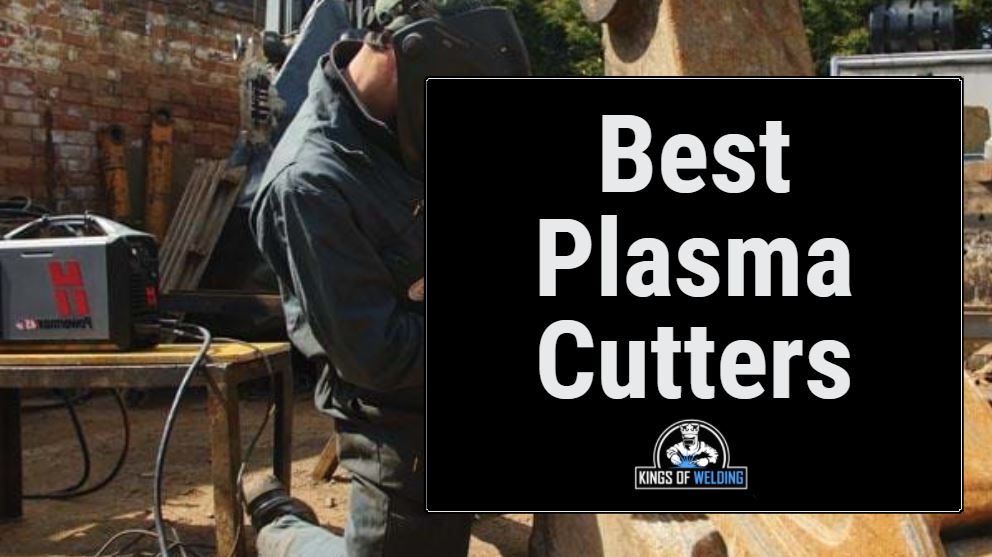
 (4.0 / 5)
(4.0 / 5) (5.0 / 5)
(5.0 / 5) (4.5 / 5)
(4.5 / 5) (4.6 / 5)
(4.6 / 5) (3.5 / 5)
(3.5 / 5)
A great guide thank you very much.
I am inexperienced in plasma cutting – do you have any advice on the best market to use to see cut lines?
Thanks, Tom
Cheers Tom.
It can be tough to see the line if you’re wearing your glasses so make sure there’s good lighting. Try a markal reflective silver pencil which is my favorite.
John
This site was… how do I say it? Relevant!! Finally I’ve found something that helped me.
Kudos!